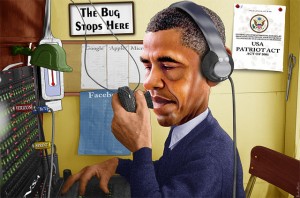Massachusetts court: NSA metadata collection not legal through Patriot Act

photo Donkeyhotey [email protected]
The Patriot Act does not approve and authorize the collection of metadata by the government, according a court ruling in the Northeast. Massachusett’s Second Circuit Court of Appeals declared that the National Security Agency’s (NSA) mass collection of all Americans’ phone metadata was against the law.
The panel ruling in ACLU v. Clapper, written by Judge Gerard Lynch, only discusses if the bulk collection was an unconstitutional violation of the Fourth Amendment and instead targets that the NSA and federal agencies are incorrect when they claim that section 215 of the Patriot Act authorized this sort of massive collection.
Section 215 may authorize some very broad gathering of information, but it nevertheless requires that it be relevant to a specific investigation. Some choice paragraphs from the 97-page ruling (via Reason.com):
The government takes the position that the metadata collected – a vast amount of which does not contain directly “relevant” information, as the government concedes – are nevertheless “relevant” because they may allow the NSA, at some unknown time in the future, utilizing its ability to sift through the trove of irrelevant data it has collected up to that point, to identify information that is relevant. We agree with appellants that such an expansive concept of “relevance” is unprecedented and warranted. …
Moreover, note the remarks on “specific investigation” and not the current broad stroke approach.
The records demanded are not those of suspects under investigation, or of people or businesses that have contact with such subjects, or of people or businesses that have contact with others who are in contact with the subjects – they extend to every record that exists, and indeed to records that do not yet exist, as they impose a continuing obligation on the recipient of the subpoena to provide such records on an ongoing basis as they are created. …
It permits demands for documents “relevant to an authorized investigation.” The government has not attempted to identify to what particular “authorized investigation” the bulk metadata of virtually all Americans’ phone calls are relevant.
“…the judges had to establish that the plaintiffs in the case, represented by the American Civil Liberties Union, have standing to sue. The federal government had been trying to get the case tossed out, using the secrecy of the program to insist that plaintiffs couldn’t prove their metadata had even been collected,” notes Reason.
“This decision is a resounding victory for the rule of law,” said ACLU Staff Attorney Alex Abdo, who argued the case before the three-judge panel in September. “For years, the government secretly spied on millions of innocent Americans based on a shockingly broad interpretation of its authority. The court rightly rejected the government’s theory that it may stockpile information on all of us in case that information proves useful in the future. Mass surveillance does not make us any safer, and it is fundamentally incompatible with the privacy necessary in a free society.”
Rep Justin Amash (R-Mich.) weighs in, noting that the proposed USA Freedom Act would actually provide the authorizations the court says Section 215 does not:
From day one following the revelation of the NSA’s bulk collection program, I have said that the warrantless collection of records on all Americans violates both the Fourth Amendment to the Constitution and the plain reading of Section 215 of the Patriot Act. Today’s Second Circuit ruling makes clear that the executive branch’s interpretation of the statute—interpreting records “relevant” to a terrorism investigation to mean all records everywhere—is “unprecedented and unwarranted.” In light of this ruling, Congress must not proceed with the latest version of the USA Freedom Act. While limiting certain types of bulk collection, the latest USA Freedom Act would authorize bulk collection of Americans’ records for the first time, thereby undoing some of the progress resulting from the Second Circuit’s decision. Instead, Congress should pass, and the president should sign, the original USA Freedom Act, as introduced in 2013 before amendments, that protects the liberty and privacy of all Americans while providing the intelligence community the authority necessary to deal with those who seek to harm us.
Sen. Rand Paul (R-Ky.):
This is a monumental decision for all lovers of liberty. I commend the federal courts for upholding our Constitution and protecting our Fourth Amendment rights. While this is a step in the right direction, it is now up to the Supreme Court to strike down the NSA’s illegal spying program. It is the duty of elected officials to protect the rights of all Americans, and Congress should immediately repeal the Patriot Act provisions and pass my Fourth Amendment Preservation and Protection Act. I will continue to fight to prevent the Washington Machine from illegally seizing any American’s personal communication.
















[…] public of abuses like the government’s secret phone-data sweeps of American households that were finally declared illegal this month in federal […]